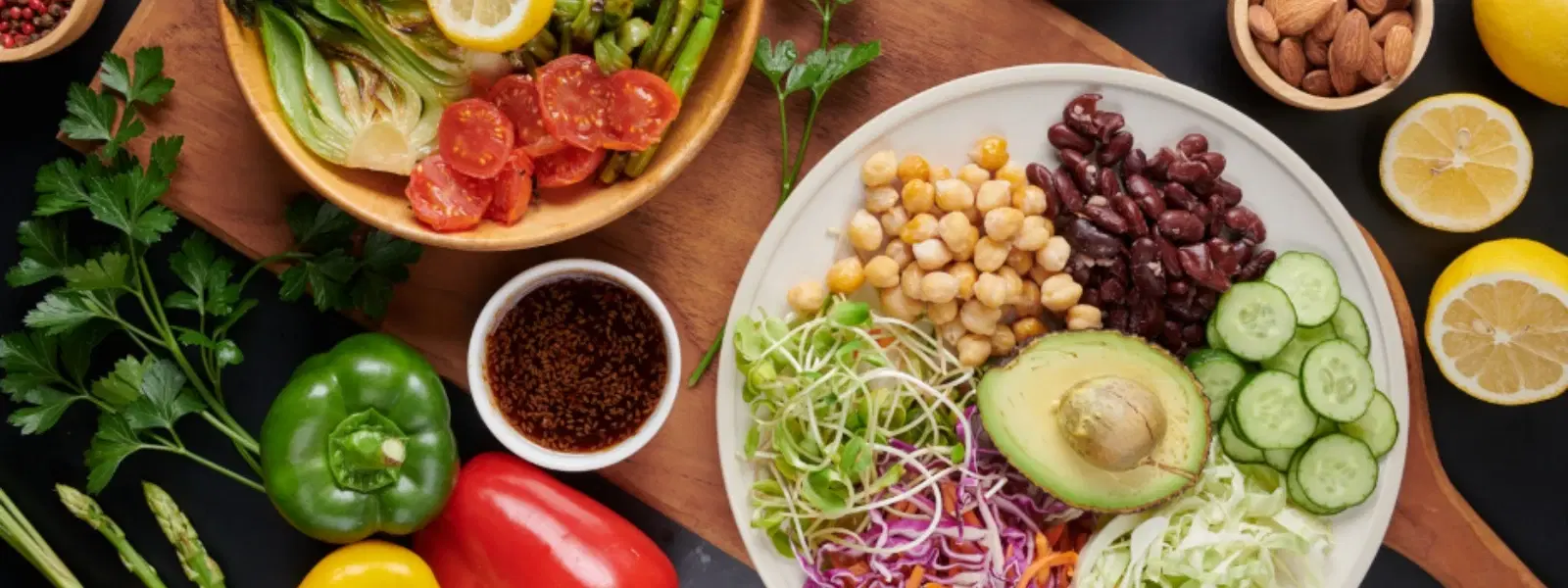
Beauty & Skincare
•04 min read
-9872eb55-9af0-4022-8644-bd8f05e8333e.png&w=3840&q=75)
Eczema can make you feel uncomfortable and affect your daily life. A simple change in your diet can help manage symptoms and support healthy skin. In this post, we share a skin eczema diet checklist to guide you on which foods for eczema relief to enjoy and which to avoid. You will learn how to design a skincare diet plan that puts anti-inflammatory foods and hydration first, creating a diet for healthy skin that benefits both your gut and your skin.
Your gut health is closely linked to skin conditions. An imbalanced gut microbiome can trigger inflammation, which may worsen eczema. Eating an anti-inflammatory diet for skin can help calm these flare-ups by reducing inflammation naturally. In addition, hydrating foods and nutrient-dense options work together to keep your skin soft and smooth, supporting your overall well-being.
Understanding your unique body is essential. Many people find that an elimination diet helps pinpoint foods that cause eczema flare-ups. For some, common allergens such as gluten, dairy, and even nickel-rich foods might lead to irritation. Being aware of these foods for eczema relief and avoiding them can create a positive impact on your skin over time.
Eating foods that soothe inflammation is key to managing eczema. Omega-3 rich options such as fatty fish not only nourish your skin but also provide a natural anti-inflammatory diet for skin. Foods high in quercetin, such as apples, blueberries, and kale, also offer antihistamine benefits. Including probiotic-rich foods like yogurt, kefir, and kimchi can support gut health and improve your skin condition.
Hydration is vital for keeping your skin healthy. Incorporate water-rich foods like cucumbers, watermelon, and celery into your meals. Herbal teas such as chamomile and green tea can be soothing for inflamed skin and are a refreshing way to stay hydrated. These skincare and nutrition tips not only help you feel better but also add a rejuvenating boost to your routine.
Insight Corner: The Role of Probiotics in Eczema Relief
Did You Know? Probiotics can help restore gut health, which plays a crucial role in managing eczema. Consuming probiotic-rich foods like yogurt and fermented vegetables may reduce the severity of eczema flare-ups over time.
-5ba1f1f6-995b-4617-a1ff-43890351cff7.png&w=3840&q=75)
Certain foods can trigger inflammation and worsen eczema symptoms. High-sugar and refined carbohydrates can cause quick spikes in inflammation. Dairy, gluten, and soy are common allergens that may worsen eczema for some people. Processed foods often contain artificial additives and preservatives that can upset your gut health and intensify flare-ups.
Some foods naturally have higher levels of histamines, such as aged cheese and cured meats. These high-histamine foods can agitate eczema symptoms in sensitive individuals. Nickel-rich foods, like chocolate, nuts, and lentils, may also cause issues for those who are sensitive. Knowing which foods to avoid for eczema can help you design a better skincare diet plan.
Building an eczema-friendly meal plan is all about balance. Start your day with a nutrient-packed breakfast, followed by a well-rounded lunch and dinner. Incorporate foods high in omega-3 fatty acids, antioxidants, and hydration. Consider snacks that include fruits or probiotic-rich options. Adding anti-inflammatory herbs and spices like turmeric and ginger can further enhance your meals.
Staying on track with a skin eczema diet is easier with a few simple tips. Planning your meals and prepping in advance reduces the stress of daily cooking. When grocery shopping, focus on whole foods and fresh produce. Remember, working with a dermatologist or nutritionist can offer personalized skincare and nutrition tips, ensuring you stick to your plan without compromising on variety.
In some cases, supplements can help complement your skin eczema diet. Supplements such as fish oil and vitamin D support a healthier skin barrier. Evening primrose oil provides additional moisture to the skin, while zinc and vitamin E are well-known for their roles in skin repair. These natural remedies for eczema can enhance the benefits of your diet when used alongside nutrient-rich foods.

Diet is only one part of managing eczema effectively. Daily stress management can make a significant difference in how your skin reacts. Staying well-hydrated and maintaining a gentle skincare routine are important steps that go hand in hand with a good diet. Avoid harsh skincare products that may strip your skin of its natural moisture. Embracing these changes can further support your journey toward healthier skin conditions.
An anti-inflammatory diet rich in omega-3 fatty acids, quercetin, and probiotics is considered ideal for managing eczema. It helps reduce inflammation and supports gut health.
Deficiencies in essential fatty acids, zinc, and vitamin D can worsen eczema symptoms. Ensuring you have these nutrients in your diet is beneficial.
No single food can cure eczema, but a balanced diet with anti-inflammatory and nutrient-rich foods can help manage symptoms.
For some people, avoiding gluten or dairy can reduce eczema symptoms, especially if they are sensitive to these foods.
It typically takes 4-6 weeks of consistent changes to notice improvements, though results can vary from person to person.
Managing eczema through diet is a powerful approach to reducing flare-ups and enhancing your overall skin health. By choosing eczema-friendly foods and avoiding common triggers, you set the stage for a skin eczema diet that works with your body. Each journey is unique, so consider consulting a dermatologist or nutritionist for tailored advice. Enjoy discovering a new way to combine skincare and nutrition for healthier, more radiant skin.